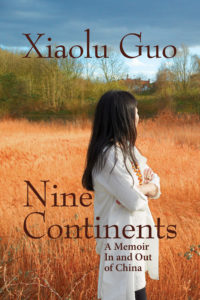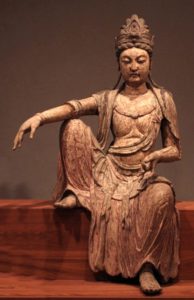 The remarkable journey of an artist (Shitang, Wenling, Beijing, China to London; 1970s – 2016): Starving is the first word that comes to mind reflecting on the vitality and accomplishments of an artist growing up under the Communist regime of Mao Zedong’s Cultural Revolution and its aftermath. For it seems Xiaolu Guo has been starving much of her life. Starved for food, family, freedoms, affection, love, individuality, dignity.
The remarkable journey of an artist (Shitang, Wenling, Beijing, China to London; 1970s – 2016): Starving is the first word that comes to mind reflecting on the vitality and accomplishments of an artist growing up under the Communist regime of Mao Zedong’s Cultural Revolution and its aftermath. For it seems Xiaolu Guo has been starving much of her life. Starved for food, family, freedoms, affection, love, individuality, dignity.
Calling herself a “peasant warrior,” Guo poignantly traces in vignettes of memories her forty years living under abominable conditions. Her perseverance, blossoming, eloquence, and the productivity and diversity of her works is all the more remarkable given the unrelenting cycle of abuse she endured – sexual, physical, emotional, intellectual. A life she says that didn’t even start until she was twenty-one, when she penned her first novel. Even when the memoirist left China for London at thirty, she describes her next ten years as a “cultural orphan.”
“Westerners will never understand the Chinese unless they go through the misery and poverty we did,” says Guo, whose hunger for Western literature and Western films sustained her when “desolation came and swallowed me.”
Named one of the Best Young British Novelists in 2013, Guo is part of what’s called the “Sixth Generation” of Chinese filmmakers, who came after the tragic events at Tiananmen Square in Beijing 1989. Drawn to the angry young artists of her generation who went underground to pursue their art since the State censored or jailed those who did not conform to it’s endorsement of art: propaganda. There can a time, though, when the writer-filmmaker recognized the only route for artistic freedom and creativity was to leave China, the homeland that shaped and traumatized her.
That trauma is what makes her art profoundly essential to her being. Recipient of numerous awards for her novels, films, poetry, short stories, and screenplays – a body of work considered autobiographical, speaking to themes echoing an impoverished, unhappy life marked by “ice-cold loneliness.” The artist recalls “one of the happiest moments in my life” at six, when she met art students who painted out the bleakness into something magical. Other good things you can pinpoint: a couple of breaks that led to her artistic development, though she earned those with feverish dedication amidst fierce competition, and bonding with her biological father, whom she first met at fourteen.
Also stunning is Guo wrote her memoir before the Me Too Movement. The China she writes of – in the seventies, eighties, and nineties – chillingly devalued women. Her parents gave her away (because they had a son? her father was imprisoned in a labor camp?, she’ll never really know) to a couple who lived in a mountain village raising yams and goats. Severely malnourished, they then gave her away to her grandparents who lived in an isolated “typhoon drenched” fishing village, Shitang, surrounded by the East China Sea – “always brown, churning the refuse and rubbish the villagers dumped in it every day.” By age two, she’d been orphaned twice.
Her grandmother, “the most humble person I have ever known,” was subjected to feudal Chinese customs: illiterate, with her feet tightly bound causing her great difficulty walking, her body bent over. Her grandfather was a “bitter, failed fisherman” after his boat was seized under the 1970 Fish Farming Collective, eventually committing suicide. He repeatedly beat her “voiceless” and “nameless” grandmother, who derived strength praying to the Goddess of Mercy, who “bestowed her compassion on all those grief-stricken wives and unlucky daughters.”

Guan Yin, “Goddess of Mercy”
By Haa900 [Public domain]
via Wikimedia Commons
Even more disturbing is physical violence on girls and women was apparently the norm in rural China in the seventies. “Where I grew up, every man beats his wife and children.” So too she depicts of the raping of girls. “No wonder Chinese ghost stories know only weeping women looking for justice in the afterlife.”
The author’s benevolent father brightened days when home. A painter for the State yet his artistic soul was tied to the sea, having also grown up in Shitang. People did what they had to do to survive; Guo hungered for more.
Wenling was a different type of village. “This was the China of the early eighties: town and nature, with no real separation of the two.” Rice patties, bamboo trees, residential compounds, and factories (shoes, plastic, silk) all together. “Every adult belonged to a work unit, run by the state.”
Wenling is where filmmaking took root as Guo gathered around a lone television in the compound watching glamorous American and British life. Here is also where she began writing “misty poetry” – “historically free” poems about the “land, the cloud-covered mountains, the foggy sea, ethereal love.”
The memoirist’s father influenced her environmentalism aesthetically and because of the devastating impact of China’s pollution, as he lost his ability to speak due to throat cancer; so many factory workers she knew were also cancer victims. “China has recorded the highest number of deaths due to pollution;” today, the country is working on solutions to this crisis.
Literature offered salvation, comfort, inspiration. Walt Whitman’s “you must travel it [the road] by yourself” was a message that stuck. American and French writers, poets, and film directors are paid tribute throughout.
Around twenty, the author earned one of eleven coveted spots at the Film and Literature Department of the Beijing Film Academy. Dorm life was still regimented like a “military camp” but at long last the author makes a friend, Mengmeng, her roommate, with whom the two open up about their sexual abuse “in the darkness of the girls’ dormitory.” Film school lasted six years, more years of barely sleeping and striving, working intensely by candlelight.
The opportunity to study films didn’t turn out the way the filmmaker hoped for. “In China, creativity meant compromise.” So she applied and won a Chevening scholarship to study documentary filmmaking at Britain’s National Film and Television School in London, where new challenges arose.
Learning English when your native language is visual imagery, coping with the dreary weather, and still very disaffected and terribly lonely, she found London a “hard place to love.” Now writing in English, she “wasn’t sure which was better; being read by thousands in the West but still feeling misunderstood, or being read by very few in a country that understood me perfectly.”
Xiaolu Guo may have felt anonymous for a good deal of her life but when one of her art films was screened at the Museum of Modern Art in New York “with a full house and then toured hundreds of thousands of international film festivals,” she’d clearly become someone known.
Chinese traditions, sacred writings, superstitions, and folklore appear throughout the telling. The memoir begins with excerpts from one of China’s most beloved pieces of classical literature, Journey to the West. This Taoist and Buddhist legend written in the 16th century introduces each of the five parts of the memoir. While I don’t purport to fully understand the spiritual message, the Monkey King’s struggles seem to foretell Guo’s.
Yet for all the “deadness at the centre of my emotional life,” Xiaolu Guo has written a life-affirming book. A timeless and universal plea cherishing human rights for all.
Lorraine